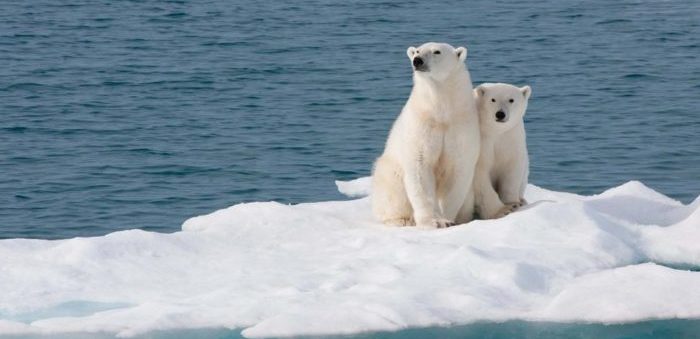On the aftermath of the polar-bear-shot-dead incident by a Hapag-Lloyd guard during an expedition cruise in Svalbard over the weekend, the Association of Arctic Expedition Cruise Operators (AECO) reiterated its guidelines for passengers and guards when encountering polar bears, to ensure that wildlife is not disturbed in this extremely fragile environment, as well as ensuring human safety.
To remind, during a Bremen cruise in Spitsbergen, a polar bear guard – an expert employed by the cruise line – was attacked on land by a polar bear. The guard suffered head injuries, however, he was responsive after the attack and was airlifted. He is out of danger, with no threat to life.
In an act of self-defence, unfortunately, it was necessary for the polar bear to be shot dead. We very much regret this incident. Hapag-Lloyd Cruises is very aware of its responsibility when travelling in environmentally-sensitive areas and respects all nature and wildlife,
…said the company in an official statement after the accident.
According to AECO, Svalbard and the high Arctic in general is a region of the world where wildlife habitats and human settlements overlap. As such, there may be encounters between polar bears and humans, which are extremely rare though thanks to strict safety protocols and regulations.
From AECO’s point of view, it is very sad when an incident leads to human injuries and the death of a polar bear. AECO’s objective is to ensure that expedition cruises and tourism in the Arctic is carried out with the utmost consideration for the vulnerable, natural environment, local cultures and cultural remains, as well as the challenging safety hazards at sea and on land.
Tourism is an important industry in many Arctic areas, AECO notes. This is also the case in Svalbard where the Norwegian government has pointed out tourism as a developing area. A year-round land-based and summer sea-based tourism brings more than 100,000 visitors to Svalbard every year.
Svalbard is a popular and well-regulated tourism destination, and incidents involving the cruise industry are rare. Expedition cruise tourism in Svalbard is subject to strict regulations and is closely monitored by the Governor of Svalbard. In accordance with Article 30 of the Svalbard Environmental Protection Act, it is prohibited to lure, pursue or otherwise seek out polar bears in such a way as to disturb them or expose either bears or humans to danger. The Governor of Svalbard enforces this law and investigates incidents where polar bears may have been disturbed.
Guidelines when encountering polar bears
AECO has put in place several guidelines and standards that go beyond legal requirements to further advance safe and environmentally friendly cruise tourism:
- Always be vigilant for bears when in “bear country”.
- Always have a plan and be ready to act to avoid encounters by implementing safety measures beforehand.
- Do not pursue, follow or lure polar bears.
- Do not seek out polar bears in such a way as to disturb them or expose bears or humans to danger.
- Never feed or leave anything edible where it can be found by bears.
- Always keep your distance to ensure the polar bears are undisturbed.
- If a polar bear is in sight, observe the animal’s behavior and be prepared to retreat or act on short notice.
- Never approach polar bears closer than 200 meters with an expedition cruise vessel.
- Small vessel and vessels with low outside decks must never allow a bear to approach the broadside.
- Keeps a distance of at least 30 meters between the Zodiac and the land/ice/spot where a polar bear is present.
- If observing polar bears from Zodiacs/small boats, these vessels must always be positioned so that the area can be left in a safe and controlled manner should the situation require it.
- Never follow or approach a swimming polar bear, from any angle. If you catch sight of a swimming polar bear, retreat immediately.
- If you are planning shore excursions, check out the terrain before landing the passengers.
- Do not make a landing if you cannot see clearly; for example, if you have low visibility due to fog.
- Do reconnaissance and look out for polar bears before any passenger comes ashore.
- Guides carrying firearms and other bear deterrents must lead the group.
- Establish a polar bear watch system and stay in places where you have good visibility of the surrounding area.
- If you find a dead polar bear, report it to local authorities in accordance with regulations and local requirements.






























































